9 min to read
Top Javascript Game Engines and Libraries
Gaming is something everyone enjoys, be it a 10-year-old kid or an employed person. There’s no better recreation at home than to plug in your headphones or speakers and get lost in the world of video games. After all, what’s better than fighting criminals or driving supercars at very high speed, or playing a sport you are bad at? For Developing the game you adore so dearly, there has to be a lot of work that goes on for months, comprising of a huge team of developers, designers, and whatnot. Wh
Gaming is something everyone enjoys, be it a 10-year-old kid or an employed person. There’s no better recreation at home than to plug in your headphones or speakers and get lost in the world of video games. After all, what’s better than fighting criminals or driving supercars at very high speed, or playing a sport you are bad at?
For Developing the game you adore so dearly, there has to be a lot of work that goes on for months, comprising of a huge team of developers, designers, and whatnot. What might seem like a small game has a lot of work and sweat put into it, mostly?
Game development these days is mostly done using Game Engines, simple software that allows you to create the graphics, sound, animations, physics, and dynamics of the game.
So in this article, we are going to talk about Game Engines and what is the best possible option right now. But before going into detail, let us talk about the basics.
Game Development
Video game development involves the methods used to create games, as the name suggests really. Making a video game involves the effort of an entire team of developers or even a single person. The making of your usual PC games or console games gets its funding from a publisher or a company. It can take anywhere between a month to who-knows-how-many years. It isn’t that easy and requires a lot of investment, both money, and hard work. Independent games, however, don’t require a lot of time and the amount of money can be reduced.
Thanks to the widely accoladed Game engines like Unreal and Unity, a common person can now make a game by himself. Not only this, you can even publish your games on the internet for other people to play them.
Game Engine
A game engine, also known as a game architecture, or game frame, is a software development environment designed to create video games. Game engines are commonly used for making video games for computers, mobile phones, or even consoles like Nintendo or Playstation.
A game engine commonly provides assets like a rendering engine for creating 2D or 3D animations, a physics engine for handling all the physics and mechanics inside the game, artificial intelligence, networking, and other such features that would help in game development. It may also include support for cinematics.
Need for Game Engine
This is one common question that makes rounds around the gaming fraternity. Since we have so many developers, engineers, and designers, what’s the need for a game engine? While it isn’t difficult to make games without a game engine, it can be a daunting task sometimes.
Game engines are used mostly to make the physics and dynamics of the gaming environment. It helps in building 2D or 3D shapes, managing textures, rendering stuff, and managing the lighting and background effects in the game.
Read This | Best Javascript Animation Libraries
If we do the same without a game engine, then it will require lots of coding, time, and money along with manpower. Game engines make the work a lot easier for the game developers.
Now that we’re done with the pre-requisites, let’s jump into the juicy stuff you wanted to read about.
Top Game Engines based on Javascript
GDevelop
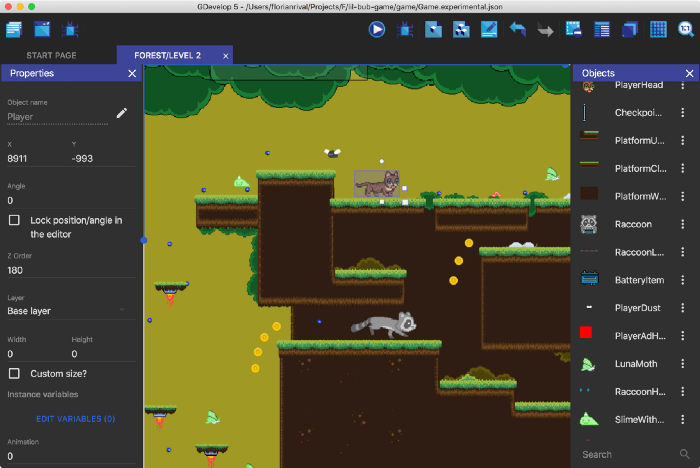
This game engine keeps its emphasis on being handy for all sorts of users, from absolute beginners to experts. It contains a lot of tools and amenities that help in creating a game.
Though the company hypes its engine a lot by saying it can be used to create excellent games on any platform, it is more suited for making 2D games.
It also allows users to export games onto platforms like Android or iOS. In short, this is a great engine for those who have an interest in creating games, and distributing them on different platforms by exporting but aren’t that fascinated about deep diving in game development.
melonJS
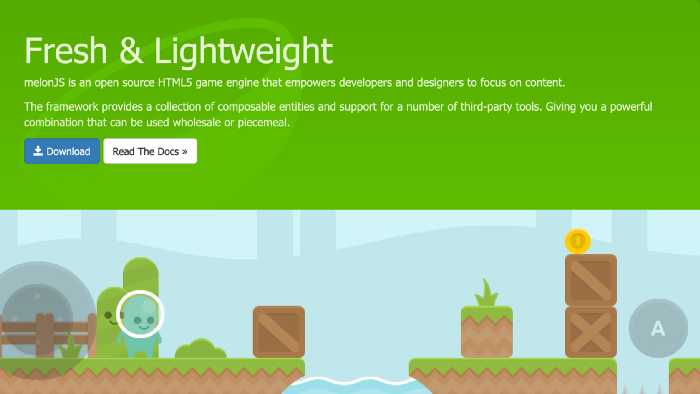
MelonJS is also a 2D-focused game engine. You can get access to all the features required for any game worth its money, such as physics support and more just by including the library in your code.
One issue that pertains to this engine is the documentation. There is not a lot of content provided by the company, but you can find a lot of user-created content so you don’t end up scratching your head.
This is a good engine for beginners and contains great potential. To summarize this, it is a great option for those who are absolute beginners to game development.
ImpactJS
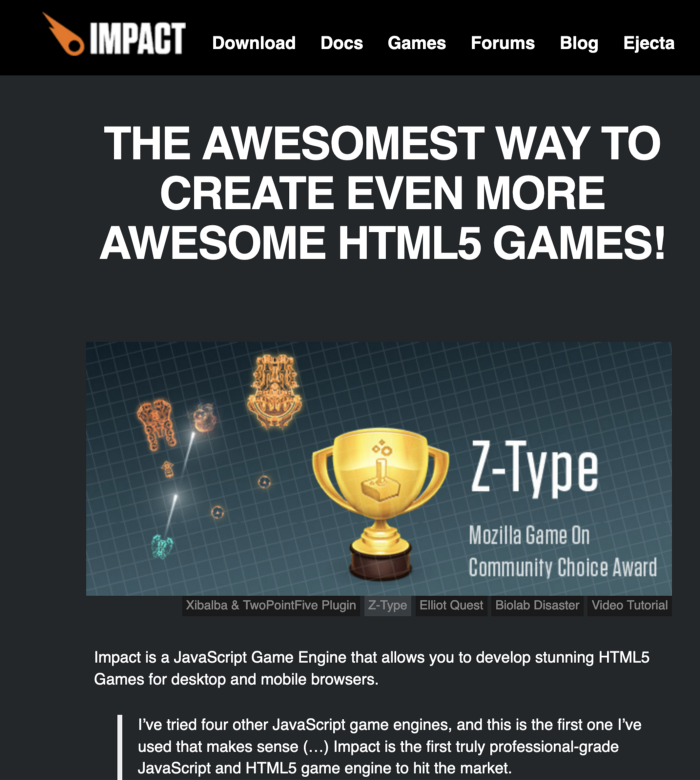
ImpactJS is a game engine, very similar to the ones mentioned above. Its main focus is on building games in 2D. But you shouldn’t think that you can’t develop 3D-like games through this engine. There are additional tools that you can add to make a 3D simulation.
Read This | How to Prepare Your App now according to all new Rails 6.1?
But what makes it slightly different from the mentioned game engines is the tools and features it gets like debugging tools, the level editor for any 2D game, and a framework by the name of Ejecta, which allows the user to publish the game to Apple’s App Store.
BabylonJS
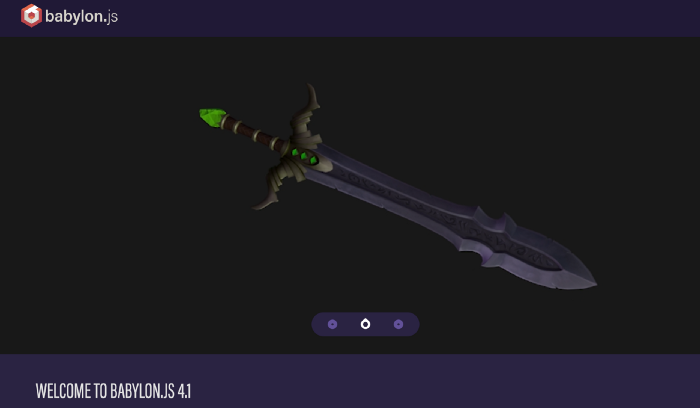
This one is not your conventional game engine by definition. Technically, it’s a rendering engine but you can create games using it. And since this is a rendering engine, you don’t get access to the plethora of tools you get in gaming engines.
An advantage of BabylonJS is that you get to create the game engine, using which you can make the game you intended for. In other words, you have full control over how you want to handle things. If you’re a beginner, we would recommend you to not use this as your first hand in game development. It is better suited for advanced users.
It also involves a lot of coding. If you are someone who wants to make a game quickly with less coding, you may probably want to skip this. If time isn’t an issue, you can opt for this.
PhaserJS
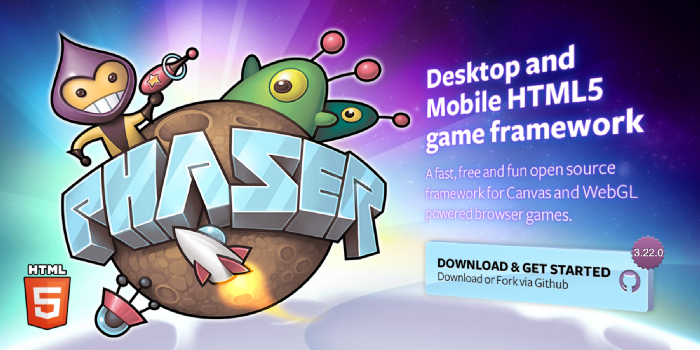
PhaserJS is a great Game Framework ready for developing games on both mobile and computers. It has support for both, WebGL and Canvas (for those devices that don’t support WebGL).
The software comes loaded with everything you might expect a game engine to have. Even then if you feel it’s less, you can add more plugins to get extra features or improve some old ones. The only con is that the plugins for the engine won’t be free. You will have to pay for them.
PixiJS

PixiJS is a strong Javascript library used to create 2D games. It is an HTML5 rendering engine that is completely compatible with WebGL API.
However, it has its shortcomings. You won’t get any pre-built engine. You’ll have to build it yourself. You’ll need to handle all the mechanics involved and the physics to be used in it.
In short, this is a great engine if you plan to make a complex game and you prioritize visual aspects more compared to the in-game mechanics.
physics

Unlike all the game engines which mostly focus on the animation and graphics part, PhysicsJS focuses on the physics part of the game. This library can be used for developing games or any other type of simulation you want to develop.
Read This | Best Text Editor to Use in 2021?
This library is capable of some very interesting interactions, and as its documentation states, you can use different types of rendering devices, based on your requirements.
Although the library may be old, don’t think that it is useless in front of the competition. In short, if you are looking to make a game engine for your own using different libraries, this would be your best friend.
Play Canvas

It is a fully web-based environment used for game development. In other words, you can use it to write your code, test the setup, run the scenes, and even export it to other platforms.
Play Canvas is capable of creating VR-supporting games and experiences, which is quite famous among people these days.
The one thing against Play Canvas is that it’s not free. It’s not like you can’t use it without buying it. You can use it but your projects will always remain public.
A-frame

A- frame is similar in most aspects to what has been mentioned for the game engines till now but where it differs is that it has compatibility for AR as well. This means you can easily create 3D games with it.
Making games for AR or VR is more suited to A-frame and it will be better to use it.
Backbone Game Engine

Backbone Game Engine is an elementary HTML5 Canvas game engine built on Backbone. It has better handling for 2D platforms and has great optimization for mobile. Backbone Game Engine was written to run inside of CocoonJS Canvas+, so you can turn your HTML5 game into a native application on iOS or Android.
KiwiJS

Kiwi.js is a fun and friendly Open Source HTML5 Game Engine. It is one of the easiest Open Source frameworks to use for making games for desktop as well as mobile web browsers. The framework primarily focuses on providing super-fast rendering and tools to make high-quality games.
You can create games for old as well as new browsers as well as for Android and iOS.
QICI

QICI engine is a free JavaScript game engine library with a web-based comprehensive suite of toolsets, mostly used for making HTML5 games. QICI Engine is based on the HTML5 framework Phasor, which uses Pixi.js for WebGL and Canvas rendering across the web browsers for desktops as well as mobile phones.
StageJS

StageJS is famous for its cross-platform game development ability. It is very light, fast, and easy to use.
It provides a tree data model to compose your application and manages the rendering cycles internally and drawing of your application, it also processes and distributes mouse and touch events to targeted tree nodes.
Panda

Panda Engine is a free HTML5 game engine for building games for mobile as well as desktop, by using Canvas and WebGL rendering.
You can track the events inside the game.
Quintus

Quintus is an easy-to-learn, fun-to-use JavaScript HTML5 game engine for mobile, desktop, and beyond.
The Quintus engine is modular and lightweight, with a concise JavaScript-friendly syntax. Instead of a deep single-inheritance-only model, Quintus provides a flexible component model in addition to traditional inheritance to make it easier to reuse functionality and share it across games and objects.
Jaws

Jaws is a game library powered by HTML5. It is mostly used for creating 2D games. It started only doing canvas but is now also supporting ordinary DOM-based sprites through the same API.
Jaws come with basic react-vs-react/circle-vs-circle collision detection that works well in most cases.
Summary
In short, gaming engines are the best option for those who want to create games quickly and without any hassle. There are a plethora of engines to choose from, based on your skill and what type of game you want to create. Hope you find the engine suitable for you.
FAQ's
What is Javascript Gaming Engine?
It gives programmers the power to create almost everything, ranging from animated logos to completely interactive 3D games, in your browser. Although it's not exactly a game engine rendering engine as it's made specifically for visualization purposes still you can build powerful games with it.
How is Javascript Gaming Engine helpful?
People can learn or level up your 1337 gamedev skills and build amazing games together for web, desktop, or mobile using these HTML5 / JavaScript game engines.
How does Javascript Gaming Engine differ from other engines?
A game engine lays the software framework to build and create video games. They provide features from animation to artificial intelligence. Game engines are responsible for rendering graphics, collision detection, memory management, and many more options.
🚀 Try Codersera Free for 7 Days
Connect with top remote developers instantly. No commitment, no risk.
Tags
Trending Blogs
Discover our most popular articles and guides
10 Best Emulators Without VT and Graphics Card: A Complete Guide for Low-End PCs
Running Android emulators on low-end PCs—especially those without Virtualization Technology (VT) or a dedicated graphics card—can be a challenge. Many popular emulators rely on hardware acceleration and virtualization to deliver smooth performance.
Android Emulator Online Browser Free
The demand for Android emulation has soared as users and developers seek flexible ways to run Android apps and games without a physical device. Online Android emulators, accessible directly through a web browser.
Free iPhone Emulators Online: A Comprehensive Guide
Discover the best free iPhone emulators that work online without downloads. Test iOS apps and games directly in your browser.
10 Best Android Emulators for PC Without Virtualization Technology (VT)
Top Android emulators optimized for gaming performance. Run mobile games smoothly on PC with these powerful emulators.
Gemma 3 vs Qwen 3: In-Depth Comparison of Two Leading Open-Source LLMs
The rapid evolution of large language models (LLMs) has brought forth a new generation of open-source AI models that are more powerful, efficient, and versatile than ever.
ApkOnline: The Android Online Emulator
ApkOnline is a cloud-based Android emulator that allows users to run Android apps and APK files directly from their web browsers, eliminating the need for physical devices or complex software installations.
Best Free Online Android Emulators
Choosing the right Android emulator can transform your experience—whether you're a gamer, developer, or just want to run your favorite mobile apps on a bigger screen.
Gemma 3 vs Qwen 3: In-Depth Comparison of Two Leading Open-Source LLMs
The rapid evolution of large language models (LLMs) has brought forth a new generation of open-source AI models that are more powerful, efficient, and versatile than ever.